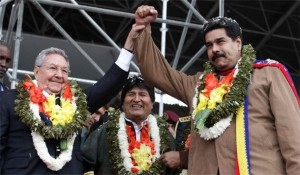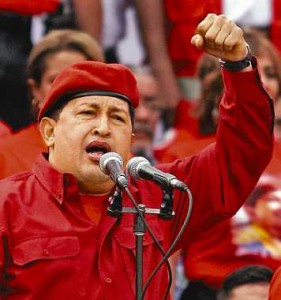By A. Shaw

Both houses of the US Congress last week passed a bill, which Pres. Obama promises to sign, imposing sanctions on Venezuela.
The sanctions deny visas to certain Venezuelans seeking to visit the USA and the sanctions seize their assets, if any, in the USA.
The main lie used as a pretext to get the bill passed was that the Venezuelan government “repressed” protesters who called for unconstitutional ouster of democratically-elected officials. In Feb. 2014, the protesters tried to force democratically-elected government officials out of office by blocking big streets with overturned cars that the protesters set afire. The street barricades caused traffic jams that sometimes involved as many as fifty thousand vehicles.
The bourgeois regime in Washington DC and the lying “cappie” media throughout the USA praised the street barricades as “peaceful” even after 40 people had been killed trying to remove or defend the barricades and this regime and media also denounced   as “repression” any effort by Venezuelan government to clear the streets of barricades. (“Cappie,” by the way, stands for capitalist or pro-capitalist. Cappie is used to convey the same courtesies as the term “Commie.”)
This monstrous bourgeois state in DC secretly distributed over a million dollars to protesters, especially to the protest leaders, to keep the protesters in the street.
Virtually the whole  bourgeois media in the USA — reactionary, moderate, and liberal — was unable to stop lying in a futile effort to make the law-breaking protesters look good.
After several months, the protesters got tired of sleeping, eating, and urinating in the streets, so the protesters went home to do these things, giving the pristine democracy in Venezuela a huge and undeniable victory over lawless protesters and their US imperialist allies. (“Pristine” because the Carter Center in Atlanta, GA, which has  supervised elections in over a hundred countries, says “Venezuela has the best electoral system in the world.”)
The US bourgeoisie was outraged that Venezuelan protesters quit after taking large bribes.
Vindictive in the extreme, the bourgeois regime under Obama decided to punish the Venezuelan Government for its successful defense of democracy against imperial intrigue.
Hence, the sanctions.
Why did the bourgeois-democratic regime in the USA stir up mercenary protesters?
Everywhere in the world, the aggressive regime in the USA attacks democracies and other forms of government to disrupt or interrupt or reverse a passing of state power to the working class, even where the proletarian state has a pristine democratic form. US imperialists don’t want workers in power under any circumstances, anywhere.
The  regime in the USA is a democracy with a bourgeois content or, in other words, a democracy in which representatives of the bourgeois class chiefly exercise state power and in which these representatives exercise power chiefly for the benefit of the capitalist class.
At this time, the regime in Venezuela is also a democracy with a bourgeois content. It’s a bourgeois state in a democratic form.
But in Venezuela, unlike in  the USA, a revolution is taking place.
“Revolution is a passing of state power from one class to another,” according to Lenin.
When power passes to the capitalist class or, more concretely, to elected representatives of the capitalist class, it’s a bourgeois revolution and a bourgeois state may emerge.
When power passes to the working class or, more concretely, to elected representatives of the working class, it’s a proletarian revolution and a proletarian state may emerge.
These representatives are elected by the Venezuelan electorate.
In Venezuela, a proletarian revolution is taking place in accordance with constitutional principles and democratic institutions. A concrete example, like Venezuela, of a passing of state power to the working class that accords with constitutional principles and democratic institutions is extremely relevant to the class struggle in the USA.
Perhaps, one day more of the US Left will discover this relevance.
So far in Venezuela, not enough state power has passed to the working class for a proletarian state to emerge although it evolves. Maybe something like 35% of state power has already passed to the working class. That’s nowhere near enough.
The power of elected public offices, including the presidency, is grossly overrated. Hugo Chavez discovered in 2002 how overrated his power was when the standing army kidnapped him. The bourgeoisie is connected to the bureaucracy and standing army by “thousands of threads,” Lenin says. It takes time and a lot of work to sever “thousands of threads.”
At least, about 51% of power must pass before a proletarian state begins to emerge.
Some observer-participants of various ideological and political trends more our less concur that the pace of the passing of state power in Venezuela from the bourgeoisie to the working class has picked-up of late.
President Maduro vows to speed up the passing of power even more in early 2015.
This pick-up in pace terrifies US imperialists who will intensify their aggressive and animal attacks on evolving proletarian democracies.















